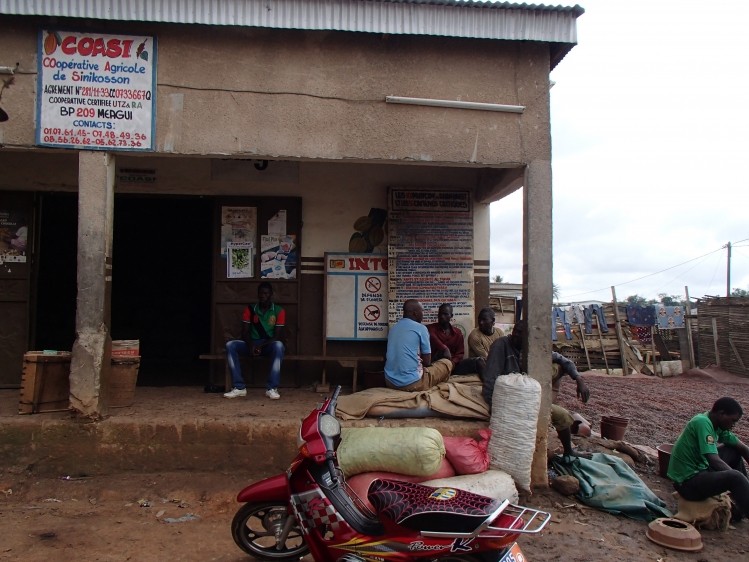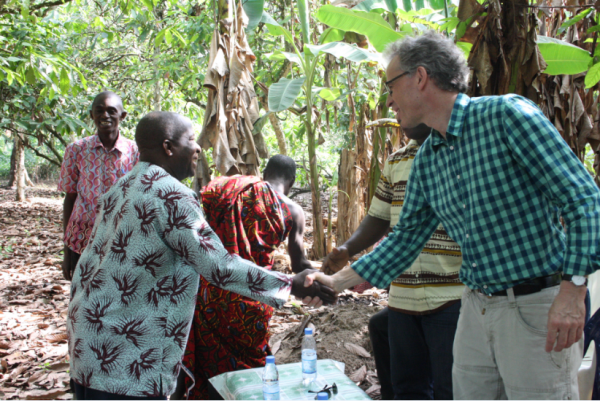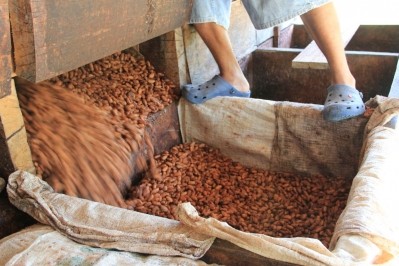No future for chocolate if cocoa farmers are deep-rooted in poverty

“The further from the tree, the better the revenues.“ I often heard this phrase while discussing inequalities in the cocoa or coffee sector. It suggests an imbalance that we should perhaps accept to exist?
Taking a trip to Ivory Coast is the best way to get in touch with reality.
Worlds apart
While visting Soubre, the heart of cocoa production in the country, my eyes were caught by the beauty of the 70 meter high ceiba trees. The UTZ certified producers received me with the traditional greeting ceremony “faire le feu,” in which people form a circle, rub the palms of their hands together, and then applaud to welcome the visitor.
Somehow I felt very close to these farmers since, just like them, I focus so much of my attention on cocoa. But in a way this is an illusion, because we are worlds apart from each other when it comes to poverty.
When the ceremony was over the producers approached me to share their experiences and concerns, and the message was clear: There is still too much poverty to have a decent and sustainable life.

Low economic returns and child labor
Today the cocoa farmer gets more attention than ever before .We eat more chocolate than ever before and the cocoa is cheap for us.
For the farmer, though, the price of producing cocoa is pretty high. The costs are also high for the environment: Soils are being eroded and deforestation of native forest is also an issue. For some children schooldays are being taken up by farm work.
The notion that the fundamentals of the cocoa supply chain are unstable is hardly disputed nowadays. And for some in the cocoa sector it is now a clear-cut decision: There cannot be a future for a sector that is built on extremely low economic returns, environmental degradation and the use of child labor.
Chocolate industry acts but farmers still poor

Can companies stimulate cocoa farmers’ economic development without jeopardizing their own economic interests? Can farmers and companies create a win-win situation?
Large industry partners such as Nestlé and Mars are investing to develop better seedlings for the sector. These days, the industry is contributing to serious child-labor remediation programs undertaken by agencies such as the International Cocoa Initiative. So, yes, efforts are already well underway. However, the question remains: is the impact visible? I am sorry to say it, but the answer is Yes and No.
Certified farmers benefit from training, and they get higher yields from their farms. More cooperatives are being set-up, and they are bringing greater benefits for their members. But, it must also be said, they are still poor.
Some children do not have a school in the village to attend. The road to the market is still bumpy or non-existent and farmers depend on a very small pool of traders to buy their production. Sons and daughters choose a life in the city, uncertain what it will bring to them, but apparently it looks more attractive than life in the rural area.
An expensive Christmas gift
Developing a more viable cocoa sector is certainly necessary and no doubt a win-win for the industry as well as farmers.
Thus, productivity needs to go up, and farmers must have their fair share of the benefits. If not, it’s no exaggeration to say that chocolate will soon develop into a small and expensive niche-product: a nice present for your mother-in-law for Christmas, but not something that can be enjoyed every day, and certainly not an industry that can support the livelihoods of millions. And that is not good for Nestlé and Mars either.




















